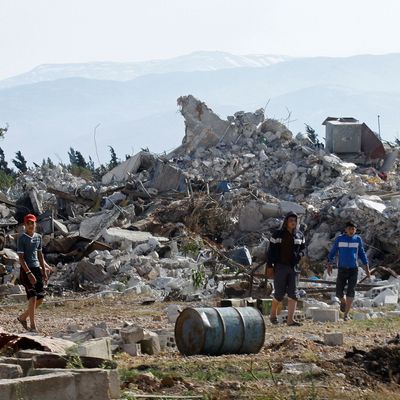
The Obama administration has finally concluded that Syrian dictator Bashar al-Assad almost certainly used chemical weapons against his own people during the country’s ongoing civil war, leading to the deaths of 100 to 150 people. This means that the infamous “red line” that President Obama mentioned (sort of by accident) last August has been crossed. Were this to ever happen, Obama said at the time, it would “change [his] calculus” for how to deal with Syria. Now, in a major shift, President Obama has authorized sending weapons to the Syrian rebels.
The White House has announced an increase in both military and nonmilitary assistance, although, on a conference call this afternoon, national-security adviser Ben Rhoades declined to provide details. “We are going to make decisions about further actions on our own timeline,” Rhodes said.
Officials were less vague, telling The Wall Street Journal and The New York Times that the U.S. will supply small arms and ammunition, though decisions on specific weapons are still being finalized. Sources say the U.S. may send anti-tank weapons, but anti-aircraft weapons are off the table. Opposition groups have said they desperately need both, but the White House is concerned about the weapons being used against civilian aircraft. The CIA is expected to coordinate the arms distribution, and teach the rebels how to use them.
John McCain, Lindsey Graham, and other hawks have long hoped that Obama’s calculus change would mean implementing a no-fly zone over Syria like the one that helped to topple Muammar Qaddafi in 2011, and on Thursday afternoon, McCain continued to push for one. But while a plan for a limited no-fly zone has been drawn up, according to a Wall Street Journal report, Obama still hasn’t decided whether he wants to put it into action.
There are fears that at this point, a small influx of arms from the U.S., or even implementing a no-fly zone, might not be enough to turn the war in the rebels’ favor. While trying to downplay reports that a no-fly zone is under consideration, Rhodes said, “there’s not even a clear guarantee that it would dramatically improve the situation on the ground.”
This post has been updated throughout.





























